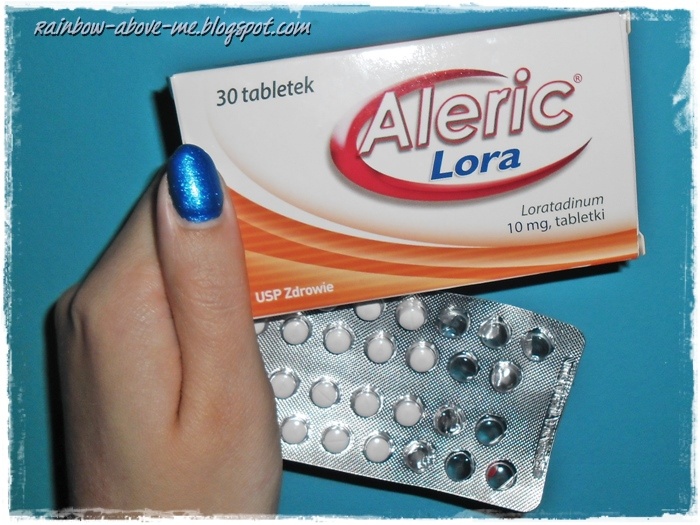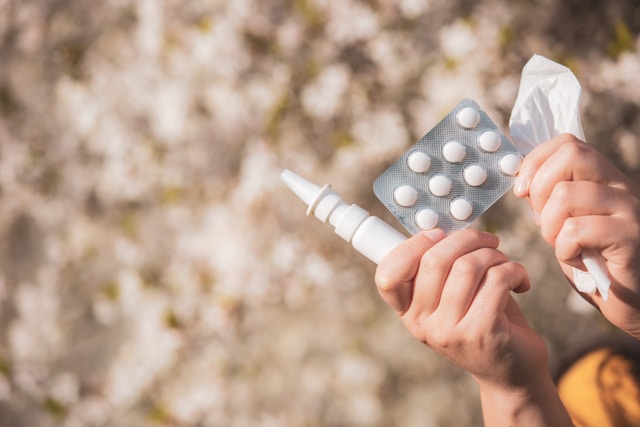

Aleric Lora

Ask a doctor about a prescription for Aleric Lora

How to use Aleric Lora
Package Leaflet: Information for the Patient
Aleric Lora
10 mg, tablets
Loratadine
Read the package leaflet carefully before taking the medicine, as it contains important information for the patient.
- Keep this leaflet, you may need to read it again.
- If you have any further questions, ask your doctor or pharmacist.
- This medicine has been prescribed for you only. Do not pass it on to others. It may harm them, even if their symptoms are the same as yours.
- If you experience any side effects, including those not listed in this leaflet, tell your doctor or pharmacist. See section 4.
Table of Contents of the Leaflet
- 1. What is Aleric Lora and what is it used for
- 2. Important information before taking Aleric Lora
- 3. How to take Aleric Lora
- 4. Possible side effects
- 5. How to store Aleric Lora
- 6. Contents of the pack and other information
1. What is Aleric Lora and what is it used for
The active substance of Aleric Lora, loratadine, is a tricyclic antihistamine, a selective antagonist of peripheral histamine H1 receptors.
Aleric Lora is an antiallergic medicine that does not cause drowsiness.
Aleric Lora is indicated for the treatment of symptoms of allergic rhinitis (such as sneezing, runny nose, and itching, itching and burning of the eyes) and chronic idiopathic urticaria.
2. Important information before taking Aleric Lora
When not to take Aleric Lora:
- if you are allergic to loratadine or any of the other ingredients of this medicine (listed in section 6).
Warnings and precautions
Before taking Aleric Lora, discuss it with your doctor or pharmacist.
- if you have severe liver impairment (see section 3. How to take Aleric Lora).
Skin tests:
You should stop taking the medicine about 48 hours before scheduled allergic skin tests, as antihistamines may cause false-negative results of these tests (may reduce or completely inhibit the skin reaction that would normally be positive).
Children
The medicine should not be taken by children under 2 years of age.
It is not recommended to take tablets (10 mg) in children whose body weight is less than 30 kg.
Aleric Lora and other medicines
Tell your doctor or pharmacist about all medicines you are taking now or have taken recently, as well as about medicines you plan to take.
This also applies to medicines available without a prescription.
Side effects may be exacerbated when taken with medicines that affect the activity of certain enzymes responsible for drug metabolism in the liver.
However, in clinical trials, no exacerbation of side effects was observed when loratadine was taken with medicines that affect the activity of these enzymes.
In the case of concomitant administration of loratadine and antibiotics (erythromycin), antifungal agents (ketoconazole), cimetidine (used in gastric and duodenal ulcer disease), an increase in loratadine plasma concentration may occur, but without clinical consequences.
Concomitant administration with loratadine of medicines that affect liver metabolism should be carried out under medical supervision.
Aleric Lora with food, drink, and alcohol
The medicine can be taken regardless of meals.
Loratadine taken simultaneously with alcohol does not enhance its effect, as shown in psychomotor performance studies.
Pregnancy, breastfeeding, and fertility
If you are pregnant or breastfeeding, think you may be pregnant, or plan to become pregnant, consult your doctor or pharmacist before taking this medicine.
As a precaution, it is recommended to avoid taking Aleric Lora during pregnancy.
Loratadine passes into breast milk, so you should not take Aleric Lora while breastfeeding.
There are no data on fertility in men and women.
Driving and using machines
In clinical trials, loratadine did not affect or had no significant effect on the ability to drive and use machines.
In some people, very rare cases of drowsiness occurred, which may impair the ability to drive and use machines.
Aleric Lora contains lactose
If you have been diagnosed with intolerance to some sugars, you should contact your doctor before taking the medicine.
3. How to take Aleric Lora
Always take this medicine exactly as your doctor has told you.
If you are not sure, ask your doctor.
The break line on the tablet only makes it easier to break the tablet to make it easier to swallow.
Recommended dose
Adults and adolescents over 12 years: 10 mg (1 tablet) once a day.
The medicine should be taken orally. The medicine can be taken regardless of meals.
Use in children
Children from 2 to 12 years:
- body weight over 30 kg: 10 mg (1 tablet) once a day;
It is not recommended to take tablets (10 mg) in children whose body weight is less than 30 kg.
In these children, loratadine can be taken in the form of syrup. The medicine is intended for children who are able to swallow a tablet.
The safety and efficacy of the medicine in children under 2 years of age have not been established.
Patients with liver function disorders:
In patients with severe liver impairment, a lower initial dose should be used, as loratadine clearance may be reduced in these patients. In such cases, adults and children with a body weight over 30 kg should be given 10 mg of loratadine (1 tablet) every other day.
There is no need to change the dose in elderly patients and patients with renal impairment.
If you feel that the effect of Aleric Lora is too strong or too weak, consult your doctor.
Taking a higher dose of Aleric Lora than recommended
If you have taken more than the recommended dose of Aleric Lora, contact your doctor or pharmacist immediately.
After an overdose of loratadine, the following have been observed: drowsiness, increased heart rate, and headache.
Your doctor will decide on the treatment.
In the event of an overdose, symptomatic and supportive treatment should be applied immediately and continued as long as necessary. Activated charcoal can be given as a water suspension. Gastric lavage can also be performed. Loratadine cannot be eliminated from the body by hemodialysis, and it is not known whether it can be eliminated by peritoneal dialysis.
After providing assistance, the patient should continue to be monitored.
There are no data indicating that loratadine causes abuse or dependence.
Missing a dose of Aleric Lora
Do not take a double dose to make up for a forgotten dose.
If you have any further questions about taking this medicine, ask your doctor or pharmacist.
4. Possible side effects
Like all medicines, Aleric Lora can cause side effects, although not everybody gets them.
Common side effects(may affect up to 1 in 10 people):
in children from 2 to 12 years - headache, nervousness, and fatigue;
in adults and adolescents - drowsiness.
Uncommon side effects(may affect up to 1 in 100 people):
in adults and adolescents - headache, increased appetite, and insomnia, fatigue, dry mouth, gastrointestinal disorders such as nausea, gastritis, and allergic reactions such as rash.
Rare side effects(may affect up to 1 in 1,000 people):
severe allergic reaction (including difficulty breathing, wheezing, itching, urticaria, swelling). If severe allergic reactions occur, stop taking the medicine and contact your doctor immediately.
dizziness, convulsions;
increased heart rate, palpitations;
abnormal liver function;
hair loss.
Side effects with unknown frequency(frequency cannot be estimated from available data)
weight gain.
In some people, other side effects may occur during treatment with Aleric Lora.
Reporting side effects
If you experience any side effects, including those not listed in this leaflet, tell your doctor or pharmacist. Side effects can be reported directly to the Department of Drug Safety Monitoring of the Office for Registration of Medicinal Products, Medical Devices, and Biocidal Products
Al. Jerozolimskie 181C,
02-222 Warsaw,
tel.: +48 (22) 492 13 01,
fax: +48 (22) 492 13 09,
website: https://smz.ezdrowie.gov.pl
Side effects can also be reported to the marketing authorization holder.
Reporting side effects will allow for more information to be collected on the safety of the medicine.
5. How to store Aleric Lora
Keep the medicine out of the sight and reach of children.
Store in a temperature below 25°C.
Do not use this medicine after the expiry date stated on the carton and blister after: EXP.
The expiry date refers to the last day of the month.
Medicines should not be disposed of via wastewater or household waste. Ask your pharmacist how to dispose of medicines no longer required. This will help protect the environment.
6. Contents of the pack and other information
What Aleric Lora contains
- The active substance is loratadine. One tablet contains 10 mg of loratadine.
- The other ingredients (excipients) are: microcrystalline cellulose, lactose, colloidal anhydrous silica, magnesium stearate, crospovidone, pregelatinized starch, stearic acid.
What Aleric Lora looks like and contents of the pack
White, round, biconvex, smooth, uncoated tablets with a break line.
Pack sizes:
Aluminium-PVC/PVDC blisters in a cardboard box:
2 tablets (1 blister of 2 tablets);
4 tablets (1 blister of 4 tablets);
7 tablets (1 blister of 7 tablets);
10 tablets (1 blister of 10 tablets).
Marketing authorization holder and manufacturer:
US Pharmacia Sp. z o.o.
ul. Ziębicka 40
50-507 Wrocław
To obtain more detailed information, please contact:
USP Zdrowie Sp. z o.o.
ul. Poleczki 35
02-822 Warsaw
tel.: +48 (22) 543 60 00
Date of last revision of the leaflet:
- Country of registration
- Active substance
- Prescription requiredYes
- Manufacturer
- ImporterUS Pharmacia Sp. z o.o.
- This information is for reference only and does not constitute medical advice. Always consult a licensed doctor before taking any medication. Oladoctor is not responsible for medical decisions based on this content.
- Alternatives to Aleric LoraDosage form: Tablets, 5 mg + 120 mgActive substance: loratadineManufacturer: SAG MANUFACTURING, S.L.U.Prescription not requiredDosage form: Tablets, 10 mgActive substance: loratadineManufacturer: Bayer Bitterfeld GmbHPrescription not requiredDosage form: Syrup, 1 mg/mlActive substance: loratadinePrescription not required
Alternatives to Aleric Lora in other countries
The best alternatives with the same active ingredient and therapeutic effect.
Alternative to Aleric Lora in Hiszpania
Alternative to Aleric Lora in Ukraina
Online doctors for Aleric Lora
Discuss dosage, side effects, interactions, contraindications, and prescription renewal for Aleric Lora – subject to medical assessment and local rules.















